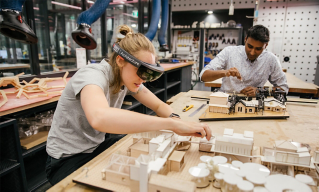Key design and creative subjects ranked #1 in Australia, top 20 in the world
RMIT has secured its position as the nation’s leading institution for design and creative fields, with Architecture / Built Environment and Art & Design both ranked #1 in Australia and in the top 20 globally in the latest QS World University Rankings by Subject.
RMIT graduates celebrated at the 2023 Victorian Premier’s Design Awards
A toolkit to help fashion businesses build better strategies for a sustainable future and a prosthetic leg for amputee motorcyclists designed by RMIT graduates were praised at the 2023 Victorian Premier’s Design Awards.
Students’ giant magpie glider helps British Consul-General take flight at Moomba Birdman Rally
RMIT students designed and built a glider resembling a giant magpie, which carried the British Consul-General for Victoria above the Yarra River as part of the 2024 Moomba Birdman Rally on Sunday 10 March.
Nanodiamonds could hold key to cool clothing
Researchers from RMIT University are using nanodiamonds to create smart textiles that can cool people down faster.





